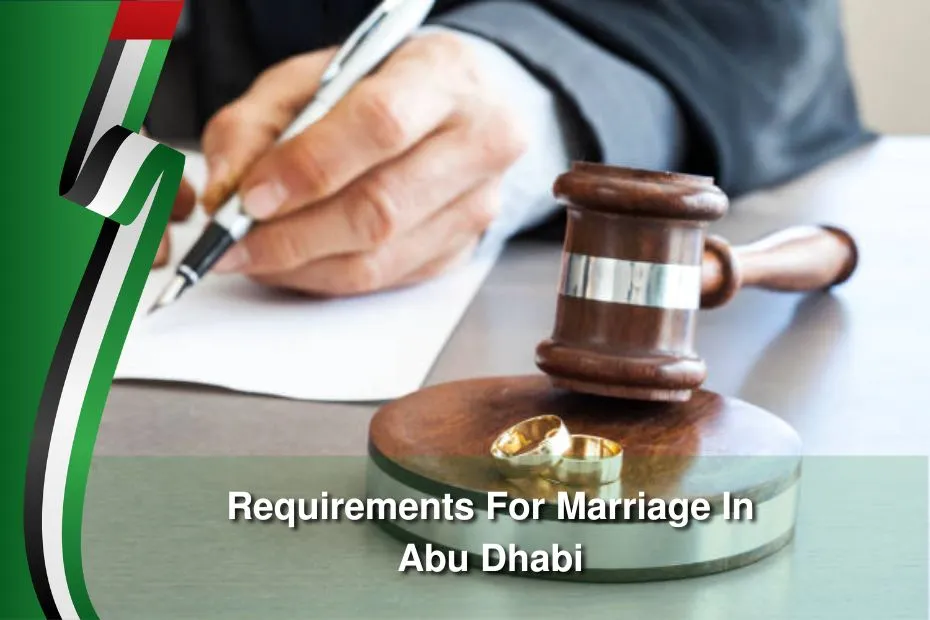Marriage is a significant legal contract that binds two individuals under the law.
Abu Dhabi offers different marriage options, including civil marriage and Sharia-based marriage, each with specific requirements.
This article outlines the legal conditions and requirements for marriage in Abu Dhabi in 2025.
Contact our expert lawyers & legal consultants in UAE. Click the WhatsApp icon below.
Table of Contents
Requirements for Marriage in Abu Dhabi
Marriage in Abu Dhabi follows specific legal requirements depending on the couple’s nationality, religion, and preference for civil or Sharia-based marriage.
Below, we outline the key requirements, procedures, and documents for civil and Islamic marriages in Abu Dhabi.
Civil Marriage in Abu Dhabi
Abu Dhabi Law No. 14 of 2021 regulates civil marriage in Abu Dhabi.
This law allows non-UAE national couples who are non-muslims to marry under secular rules regardless of nationality or residency.
To get married at the Abu Dhabi Civil Family Court, the couple must meet the following conditions:
Both individuals must not be UAE nationals who are Muslim.
Both individuals must be at least 18 years old.
Both individuals must give their full consent to the marriage.
The couple must not be related by the first or second degree.
Neither person can be married to someone else at the time of marriage.
Couples can submit a civil marriage application through the Abu Dhabi Judicial Department (ADJD) website or ADJD typing centers in Abu Dhabi.
Required Documents for Civil Marriage
Requirements for marriage in Abu Dhabi for civil weddings mandates applicants to submit:
A completed marriage application form.
Copies of both parties’ passports or Emirates ID (if a resident).
Proof of dissolution of a previous marriage, if applicable (e.g., divorce judgment or death certificate).
A pre-nuptial agreement (optional).
Marriage Ceremony Required Steps
Once the couple’s marriage is scheduled, they will receive an email confirmation of the ceremony date. The following steps outline the marriage process:
- The couple gets a confirmed ceremony date via email.
- The couple must visit the Abu Dhabi Civil Family Court at Gate 5 on the scheduled day and present their ID documents.
- A marriage notary officiates the ceremony, with vows played in a pre-recorded voiceover in multiple languages. Witnesses are not required, as the notary serves as an official witness. Couples may exchange rings and bring photographers or videographers.
- After the ceremony, the couple signs the marriage certificate, completing the legal process.
While no additional steps are required, many couples choose to have their marriage certificate attested by the UAE Ministry of Foreign Affairs for official use in their home country.
Islamic (Sharia) Marriage in Abu Dhabi
Islamic marriages follow Sharia law, which applies if both the groom and the bride are Muslims or the groom is Muslim, and the bride is from the “Ahl Al-Kitaab” (People of the Book), such as a Christian.
While Sharia law permits a Muslim man to marry a non-Muslim woman, a Muslim woman is not allowed to marry a non-Muslim man unless he has converted to Islam.
Polygamy is permitted under Sharia law. A Muslim man may have up to four wives, provided he ensures equal support and fair treatment for all of them.
Legal Requirements for Muslim Marriages
The following are the Sharia law requirements for marriage in Abu Dhabi:
- The marriage contract must be registered in a Sharia court in the UAE.
- The legal minimum age for marriage is 18 years in the Hijri calendar; otherwise, approval from the judge is required.
- The age difference between spouses should not be more than double; if so, the judge’s approval is necessary.
- A premarital screening certificate is required.
- Both the couple must be present.
- The bride’s father, his representative, and two male Muslim witnesses must be present.
- The woman must obtain consent from her guardian to marry.
- If the father is deceased, the closest male guardian (such as the elder brother) must be present.
- Divorced or widowed women must provide proof of their status.
- A “No Objection” letter from her embassy or consulate is required if the bride is Muslim and her father is not.
Learn about the New UAE Personal Status Law effective from 15 April 2025.
Legal Services Related to Marriage in Abu Dhabi
Our law firm in UAE provides specialized legal services to assist couples in navigating the marriage requirements in Abu Dhabi. Our expertise includes:
Legal Consultation: Advising on the eligibility criteria and required documents for civil and Sharia marriages.
Application Assistance: Helping with the submission of marriage applications through ADJD portals and typing centers.
Document Preparation & Review: Ensuring all required documents, including pre-nuptial agreements, meet legal requirements.
Marriage Agreement Notarization: Facilitating legal drafting and notarization of marriage contracts.
Marriage Certificate Attestation: Assisting with Ministry of Foreign Affairs attestation for international recognition.
Legal Representation: Representing clients before Abu Dhabi Civil Family Court in case of legal disputes or clarifications.
FAQs about Abu Dhabi Marriage Regulations
Conclusion.
Requirements for marriage in Abu Dhabi are governed by clear legal regulations, with options for civil and Sharia-based unions.
While civil marriage offers secular, fast-track options, Islamic marriage follows Sharia principles.
Our law firm is here to provide expert legal guidance to ensure compliance with Abu Dhabi’s marriage laws.
Contact our law firm in UAE for expert help. Click the Whatsapp icon below.
Omar Al Mansoori is an Emirati legal advisor and researcher with over 10 years of experience in civil, commercial, and corporate law in the UAE. He focuses on simplifying complex legal topics and ensuring that every article published aligns with the latest national legislation and official regulations.
